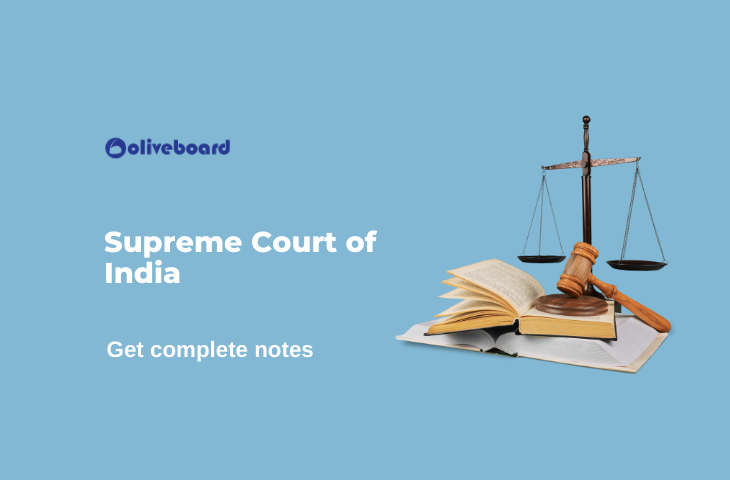Static GK is an important section of various government exams. Questions on the Supreme Court of India are commonly asked in different SSC, Railway & other government exams. Get complete study notes on the Supreme Court of India in this blog.
On the 28th of January, 1950, two days after India became a Sovereign Democratic Republic, the Supreme Court came into being. It succeeded the Federal Court of India which was established under the Government of India Act, 1935.
Supreme Court of India
Articles from 124 to 147 in Part V of the constitution deal with the organization, independence, jurisdiction, powers procedures of the Supreme Court.
The Procedure of the Supreme Court of India
The Constitutional Cases are usually decided by a bench consisting of five judges whereas other cases are decided by a bench of at least three judges.
Supreme Court Composition
- The original Constitution of 1950 envisaged a Supreme Court with a Chief Justice and 7 puisne Judges – leaving it to Parliament to increase this number under Article 124 (1) and currently, there are 34 judges including the Chief Justice of India (CJI). Current CJI : NV Ramana
- The judges sit in benches of 2 or 3 (called a Division Bench) or in benches of 5 or more (called a Constitutional Bench) when there are matters of fundamental questions of the law is to be decided.
The seat of Supreme Court
As per the Constitution of India, Delhi is declared as the seat of the Supreme Court of India. However, the Chief Justice of India has the power to assign another place (s) as the seat of the Supreme Court. This is only an optional and not mandatory.
Appointment of Judges
Article 124 (2) states that every Judge of the Supreme Court is appointed by the President by warrant under his hand and seal after consultation with any number Judges of the Supreme Court and High Courts as the President may deem necessary.
Conditions for appointment of judges
Article 124 (3) mentions that a citizen of India can be appointed as a judge of the Supreme Court if the person :
(a) has been a Judge of a High Court or of two or more such Courts in succession for at least five years ; or
(b) has been an advocate of a High Court or of two or more such Courts in succession for at least ten years ; or
(c) is a distinguished jurist, in the opinion of the President
Age of retirement
Age of retirement of the Supreme court judges is 65 years.
Resignation and removal of judges
- A judge can resign by writing under his/her hand addressed to the President
- A judge can be removed on the ground of proved misbehaviour or incapacity by an order of the President and passed by a special majority according to Article 368 in the Parliament (Article 124(4))
Salaries and allowances of judges
125(1) and the Second Schedule previously specified the salary paid to the judges.
- Through the 54th Constitutional-Amendment, Parliament has gained the power to determine the salaries of Supreme Court Judges by law.
- Parliament also has the authority to determine questions relating to the privileges, allowances, etc., for these Judges.
Functions and powers of Supreme Court
The judgement of SC is binding on all the courts in India and on the Union as well as the state governments.
i) Original jurisdiction of the Supreme Court
Supreme Court has original jurisdiction in any dispute –
(a) between the Government of India and one or more States; or
(b) between the Government of India and any State of States on one side and one or more other States on the other; or
(c) between two or more States.
ii) Writ Jurisdiction
Under Article 32, Supreme Court enjoys powers for the enforcement of Fundamental Rights. It is exercised in the nature of writs, viz; Habeas Corpus, Mandamas, Certiorari, Quo Warranto and Prohibition.
iii) Appellate Jurisdiction
The Supreme Court is the highest court of appeal in all Civil, Criminal and Constitutional cases. Under “special leave to Appeal” the Supreme Court has discretionary powers to take cases from High Courts.
Supreme Court can take up cases suo moto under Article 131 of the Indian Constitution.
iv) Advisory Jurisdiction
President can seek advisory opinion of the Supreme Court when he/she deems necessary.
v) Revisory Jurisdiction
Under the article 137, the Supreme Court can revise its own judgment, order or direction
Parliament by law can extend the jurisdiction of the Supreme Court.
Supreme Court of India – FAQs
- Who appoints the judges of the Supreme court?
A. The president appoints the judges of the Supreme court after consultation with the Chief justice.
2. Which articles gives the Supreme court writ jurisdiction?
A. The Supreme court can issue write under Article 32.
Hi, I’m Tripti, a senior content writer at Oliveboard, where I manage blog content along with community engagement across platforms like Telegram and WhatsApp. With 3 years of experience in content and SEO optimization, I have led content for popular exams like SSC, Banking, Railways, and State Exams.
